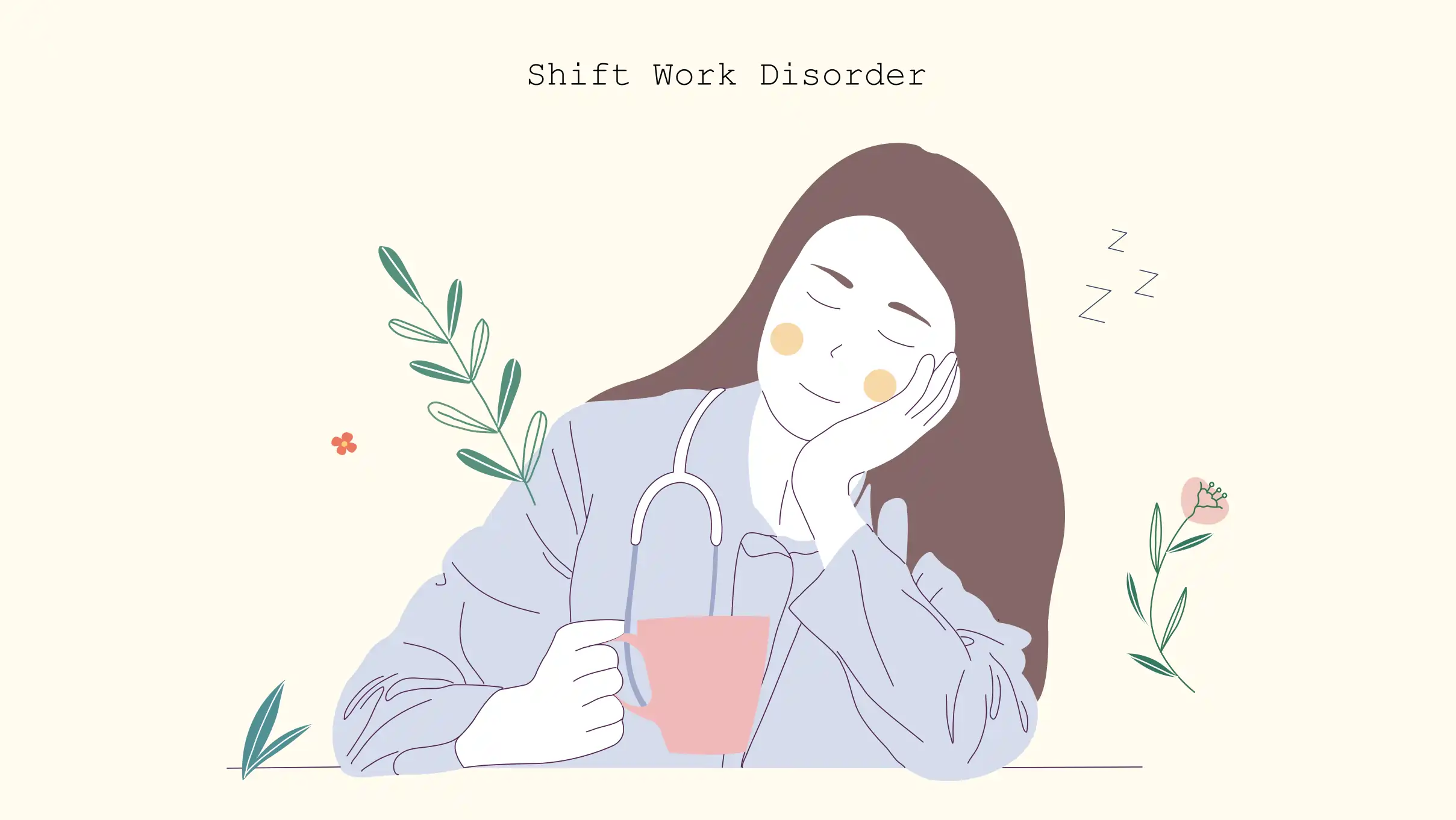Shift Work Disorder: Symptoms, Risks & Treatment
Written by

Medical reviewed by


Night shifts can be tough on both the mind and body. And throughout the industrialised world, one in five employees works these nontraditional shifts. These ‘nontraditional’ shift works often lead to numerous negative health consequences, ranging from cognitive complaints to cancer.
The negative consequences and health complaints are associated with a circadian rhythm sleep disorder, known as shift work disorder. Shift work sleep disorder is characterised by excessive sleepiness, insomnia, and other complications related to sleep disorder.
This article further reviews what is shift work disorder, its symptoms, diagnosis, and treatment. Keep reading to keep safe!
What Is Shift Work Disorder
Shift work disorder is a sleep disorder triggered by circadian misalignment resulting in insomnia, excessive sleepiness, or both. Shift workers who work nontraditional hours outside the typical 9 A.M. to 5 P.M. Workday develops shift work disorder. As a result, these individuals experience significant adverse health consequences with dramatically increased accident risk.
Furthermore, shift workers have been reported to sleep 15 minutes less per day compared to day workers. And if the condition is left untreated, shift work disorder can lead to significant health concerns, particularly regarding social functioning, quality of life, and health.
These individuals experience significant negative health consequences with dramatically increased accident risk, higher rates of ulcers, absenteeism, depression, and missed family and social activities more frequently.
Besides the negative consequences, what are the symptoms of shift work sleep disorder exactly?
What Are the Symptoms of Shift Work Sleep Disorder
Shift work sleep disorder happens when the circadian rhythm is disturbed, causing hormonal disturbance of hormones like melatonin. Melatonin is a hormone that the brain produces in response to darkness and is also called the hormone of darkness.
Furthermore, a study reported that rotating shifts have the least negative impact on sleep length, including a night shift, when compared with permanent night shifts.
The influence of night shift work is involved primarily in the disruption of the natural day-night rhythm of an individual. And the most immediate adverse consequences of shift work sleep disorder are related to the weakening of cognitive abilities, which can cause the workers to experience,
- Insomnia
- Sleep loss
- Excessive sleepiness
- Difficulty paying attention
- Lack of energy
- Depression
- Anxiety
- Alcohol abuse
- Poor coping skills
- Irritability
- Poor sleep quality
- Gastrointestinal issues
- Metabolic disorder
- obesity
- Increased risk for cardiovascular disease
The above shift work disorder symptoms can cause some complications, which can be chronic until treated.
5 Complications of Sleep Disorder
Sleep disorders are also commonly associated with other medical conditions, weakening of cognitive abilities, chronic pain, and mental illness. If left untreated, shift work disorder can lead to severe complications.Sleep disturbances, including insomnia, or irregular sleep patterns, result in various cognitive impairments and mood disorders. Sleep deprivation or chronic sleep disorder are risk factors for major depression and bipolar disorder, whereas disturbed sleep is a key symptom of mental disturbances. This can cause people to feel impatient, irritable, and unable to cope with problems or conflicts.
1. Mood Problems
Sleep disturbances, including insomnia, or irregular sleep patterns, result in various cognitive impairments and mood disorders. Sleep deprivation or chronic sleep disorder are risk factors for major depression and bipolar disorder, whereas disturbed sleep is a key symptom of mental disturbances. This can cause people to feel impatient, irritable, and unable to cope with problems or conflicts.
2. Poor Work Performance
Shift work disorders have an adverse effect induced on cognitive functions. It can cause the workers to lose concentration and struggle with remembering things. It is also found to significantly reduce work performance and alertness, particularly working conditions, organisation, or both. And decreased alertness can impair the memory and ability to think and process information.
3. Higher Accident Risk
Sleep disorder decreases alertness, impairing memory and the ability to think and process information. This puts workers at higher risk of committing errors or being involved in an accident. Besides workplace accidents, it’s a basic understanding that drivers need to have all their attention on the road while driving, and drowsy drivers can cause fatal accidents.
4. Added Health Problems
Shift work sleep disorder and subsequent sleep loss can cause a worker to experience related health problems and medical complications, which include gastrointestinal issues, metabolic disorders, obesity, poor sexual health, increased risk for cardiovascular disease, and vulnerability to multiple forms of cancer. In women, shift work disorder can reduce fertility and cause problems during pregnancy.
5. Low Testosterone
Various disorders of sleep may result in a reduction in testosterone levels. However, Shift work disorder does not affect testosterone, and unless severely disrupted, sleep quality is not determined by testosterone. Relatively low testosterone is due to obesity, which is one of the shift work disorder symptoms.
How Is Shift Work Sleep Disorder Diagnosed
The American Academy of Sleep Medicine (AASM) established the criteria for diagnosing shift work sleep disorder and published it in the International Classification of Sleep Disorders. Therefore, doctors will use the diagnostic criteria to determine whether the worker has a shift work sleep disorder.
The doctors may employ the International Classification of Sleep Disorders, the newest edition of the Diagnostic and Statistical Manual of Mental Disorders, or both. These methods will require the doctor to ask the patient questions regarding their sleep pattern and sleep disturbance; they may also ask what sort of shift the patient is currently working.
Since shift work disorder symptoms are similar to other sleep disorders, a study reports using the International Classification of Diseases–10th Revision to rule out the symptoms that are not attributable to another sleep disorder, medical condition, or medication effect. They might also order a sleep study and ask the patient to sleep in a clinic overnight to monitor the situation and symptoms.
After the diagnosis, based on the results, patients are treated. But how is shift work sleep disorder treated?
How Is Shift Work Sleep Disorder Treated
Shift work requires a lifestyle change because employees cannot change their work hours. And during the shift work sleep disorder treatment, doctors adhere to the patient’s goals for treatment, including specific and measurable quality of life outcomes, besides sleep.
The symptoms of shift work disorder can be treated using behavioural, prescription, and nonprescription therapies. One shift work disorder treatment guideline suggests non-medication interventions, such as exercise and exposure to light. At the same time, others suggest medications that contain melatonin to have clinical benefits in some patients with shift work disorder.
According to a study mentioned above, patients with excessive sleepiness are associated with shift work disorder, and the use of the above therapies can significantly improve sleep, performance, and quality of life for patients with shift work disorder.
In addition, though melatonin supplements can help with sleep disorders, according to a review of 8 studies, the use of melatonin supplements as shift work disorder medication was generally small or inconclusive. So, it’s better to set up an appointment with a doctor rather than get some non-prescribed or over-the-counter medicines for self-diagnosis.
Shift Work Sleep Tips
As mentioned before, Shift work requires a lifestyle change. And to mould your lifestyle around your shift work, the following are 10 tips to manage sleep, health, and shift work:
- To maintain a healthy sleep routine, it is important to follow certain practices. Firstly, limit light exposure during the journey home after night shift work to prevent the internal “daytime clock” from activating. Additionally, establish bedtime rituals and incorporate dedicated sleep time into your daily schedule. These measures can help regulate your sleep-wake cycle and promote better quality sleep.
- Try to keep regularity in your sleep patterns, even on days off.
- When working night shifts, try to shift the sleep schedule close to the start of the next night shift instead of going to bed right after getting home in the morning. Alternatively, split the sleep schedule, sleep for a few hours after getting home in the morning and then take an extended nap that ends just before the next night shift.
- Improve your sleep environment, and keep the bedroom cool, dark, and quiet.
- If you live with family or roommates, to achieve darkness and quietness, use an eye mask or blackout shades, wear earplugs or try a white noise machine or app.
- Avoiding phone usage before bed and during sleep is crucial for better sleep. The blue light from phones disrupts melatonin production, mental stimulation hinders relaxation, and checking the phone disturbs sleep. Establish a digital curfew and engage in calming activities instead.
- Make yourself and the bed comfortable with a pillow, your favourite pyjamas, slippers, etc.
- Practising a soothing pre-bedtime routine, such as taking a warm shower or using aromatherapy, helps promote better sleep by signalling to the body and mind to relax and prepare for rest. A warm shower lowers body temperature and relieves tension, while aromatherapy with calming scents like lavender can activate the brain’s relaxation response, reducing stress and anxiety.
- Consuming caffeine, found in beverages like coffee, cola, and energy drinks, can be done before the start of your shift to help promote alertness. However, it is important to avoid consuming caffeine within 4 hours before going to bed. This is because caffeine is a stimulant that can interfere with your ability to fall asleep and negatively impact the quality of your sleep.
- It is advisable to avoid consuming alcohol before bed as it can significantly reduce the quality of your sleep. While alcohol may initially make you feel drowsy and help you fall asleep faster, it disrupts the natural sleep cycles and prevents deep, restorative sleep. As a result, you may experience more frequent awakenings during the night, decreased REM sleep, and overall poorer sleep quality.
Final Words
One in five employees who work the nontraditional shift suffers from a circadian rhythm sleep disorder, known as shift work disorder. If the condition is left untreated, shift work disorder can lead to health concerns regarding social functioning, quality of life, and health.
And since shift work disorder symptoms are similar to other sleep disorders, doctors may employ the International Classification of Sleep Disorders. After the diagnosis, the symptoms of shift work disorder can be treated using behavioural, prescription, and nonprescription therapies.
However, Shift work requires a lifestyle change. So follow the tips mentioned in the article to make life a little easier. Also, consult with doctors before employing any sedative or hypnotic medications.
FAQs
Is shift work disorder a disability?
The sleep disorder known as shift work sleep disorder (SWSD) frequently affects people who work irregular hours, such as those outside of the typical 9 a.m. to 5 p.m. workday. Shift work schedules disrupt most people’s internal body clocks or circadian rhythms.
What is prescribed for shift work disorder?
Modafinil and armodafinil are two wakefulness-promoting medications that have received FDA approval to treat shift work disorder. If taken an hour before work, these medications may help you be more alert throughout your shift.
How long does shift work disorder last?
As some people experience temporary insomnia symptoms due to environmental factors, the condition is referred to as short-term insomnia until the three-month duration benchmark is reached. Similarly, symptoms must have been reported for at least three months for a shift work disorder diagnosis.
people like this article
Written by

Medical reviewed by

Read More About Sleep Deprivation
• 7 min read





